 Focus Question: What is the state of boundaries in your work right now? Description Boundaries are a critical part of remote work. They are important for productivity as well as well-being. Consider the multiple layers of boundaries which can be important including:
What are the boundaries which are important for you to take note of? What happens when boundaries aren’t clear? Which boundaries need some shoring up? Boundaries often get clear when we explore priorities and values. What are your core priorities for the next three months and how can these help you get more discerning around what you are going to say YES to, and NO to? 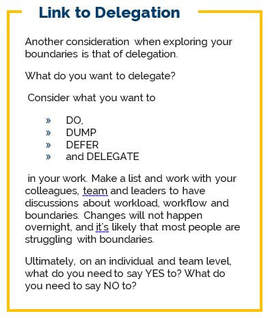 Activity Take note of the boundaries which exist in your work right now. What needs to be clarified or strengthened? What’s the cost of too many lax boundaries? For more on this topic check out: PlanDoTrack sections on Delegation. Teams365 blog posts on Boundaries including: Teams365 #2087 – Remote Working Myth – Boundaries aren’t important. Find this at here. Best, Jennifer Jennifer Britton
Co-host of the Remote Pathways Podcast Potentials Realized – Coaching, Training and Consulting Services for remote teams, leaders and professionals Check out the most recent Remote Pathways Podcast Episode, where we explore the people, places and processes of exceptional remote work. You can listen to the latest episode here, or on your favorite podcast player.
0 Comments
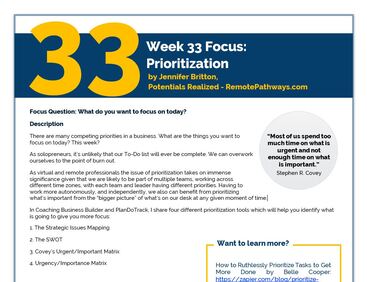 Focus Question: What do you want to focus on today? Description There are many competing priorities in a business. What are the things you want to focus on today? This week? As solopreneurs, it’s unlikely that our To-Do list will ever be complete. We can overwork ourselves to the point of burn out. As virtual and remote professionals the issue of prioritization takes on immense significance given that we are likely to be part of multiple teams, working across different time zones, with each team and leader having different priorities. Having to work more autonomously, and independently, we also can benefit from prioritizing what’s important from the “bigger picture” of what’s on our desk at any given moment of time. In Coaching Business Builder and PlanDoTrack, I share four different prioritization tools which will help you identify what is going to give you more focus: 1. The Strategic Issues Mapping 2. The SWOT 3. Covey’s Urgent/Important Matrix 4. Urgency/Importance Matrix 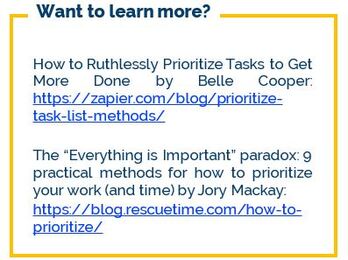 Activity It can be useful to adjust our lists and tasks laying them out in different ways get different perspectives. Here are several ways to slice up your current list: Make a list of the most important tasks you have on your plate right now. Assign them a weighting in terms of a 1-10. Then look at the original list again and distribute them according to whether it’s something you can DO, DELEGATE, DEFER or DUMP. Now renumber them again. Assign those that can be deferred to a new list or schedule them in. Dump items need to get dumped. Delegate those onwards that you can. What do you notice now? If you are doing some longer-term planning, refer to the SWOT and/or Strategic Issues Mapping which you’ll find in PlanDoTrack If you are feeling overwhelmed, stuck or working on immediate priorities consider using the other prioritization tools. For more on this topic check out Pages 118 to 125 of the PlanDoTrack Workbook and Planner. These sections cover the topics of Time Management and Personal Productivity for the Virutal and Remote Professional. Best wishes, Jennifer Jennifer Britton
Co-host of the Remote Pathways Podcast Potentials Realized – Coaching, Training and Consulting Services for remote teams, leaders and professionals Check out the most recent Remote Pathways Podcast Episode, where we explore the people, places and processes of exceptional remote work. You can listen to the latest episode here, or on your favorite podcast player. 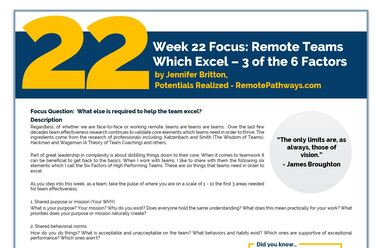 Focus Question: What else is required to help the team excel? Description Regardless, of whether we are face-to-face or working remote, teams are teams are teams. Over the last few decades team effectiveness research continues to validate core elements which teams need in order to thrive. The ingredients come from the research of professionals including: Katzenbach and Smith (The Wisdom of Teams), Hackman and Wageman (A Theory of Team Coaching) and others. Part of great leadership in complexity is about distilling things down to their core. When it comes to teamwork it can be beneficial to get back to the basics. When I work with teams, I like to share with them the following six elements which I call the Six Factors of High Performing Teams. These are six things that teams need in order to excel. 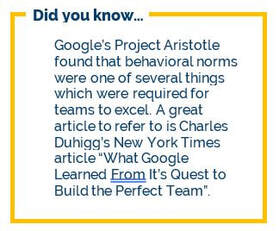 As you step into this week, as a team, take the pulse of where you are on a scale of 1 - 10 the first 3 areas needed for team effectiveness: 1. Shared purpose or mission (Your WHY) What is your purpose? Your mission? Why do you exist? Does everyone hold the same understanding? What does this mean practically for your work? What priorities does your purpose or mission naturally create? 2. Shared behavioral norms How do you do things? What is acceptable and unacceptable on the team? What behaviors and habits exist? Which ones are supportive of exceptional performance? Which ones aren't? 3. Shared commitment What are team members committed to? What will you get done, no matter what? Is there anything that needs to be dropped off the list?  Activity Where are we in each of the Six Factors? What requires attention? For more on this topic check out: Teams365 #1145 – Team Leader Breakfast Series – Six Factors (Audio) Teams365 #1920- Team Development – Revisiting the Six Factors Enjoy your reflections! Jennifer Jennifer Britton
Co-host of the Remote Pathways Podcast Potentials Realized – Coaching, Training and Consulting Services for remote teams, leaders and professionals Check out the most recent Remote Pathways Podcast Episode, where we explore the people, places and processes of exceptional remote work. You can listen to the latest episode here, or on your favorite podcast player. 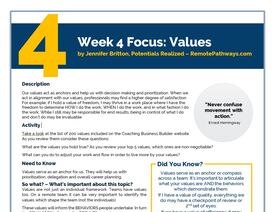 Description Our values act as anchors and help us with decision making and prioritization. When we act in alignment with our values, professionals may find a higher degree of satisfaction. For example, if I hold a value of freedom, I may thrive in a work place where I have the freedom to determine HOW I do the work, WHEN I do the work, and in what fashion I do the work. While I still may be responsible for end results, being in control of what I do and don’t do may be invaluable. 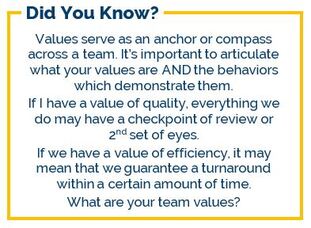 Activity Take a look at the list of 200 values included on the Coaching Business Builder website. As you review them consider these questions: What are the values you hold true? As you review your top 5 values, which ones are non-negotiable? What can you do to adjust your work and flow in order to live more by your values? Need to Know Values serve as an anchor for us. They will help us with prioritization, delegation and overall career planning. So what? – What’s important about this topic? Values are not just an individual framework. Teams have values too. On a remote team it can be very important to identify the values which shape the team (not the individuals). These values will inform the BEHAVIORS people undertake. In turn the BEHAVIORS influence the RESULTS we get. Discussion around values as a team, is not just a “nice to have” but an essential discussion. For more on this: Check out section 1 and section 4 of PlanDoTrack and Coaching Business Builder. Section 1 gets to you to explore what behaviors flow out of your values. Again, if you have a value of freedom, what behaviors does it lead to? How can that help and/or hinder your work and relationships with others in the remote space? What’s important this year? What are going to be your anchors? All the best, Jennifer Check out the most recent Remote Pathways Podcast Episode which covers the topic of Vision. You can listen to Episode 4 here, or on your favorite podcast player.
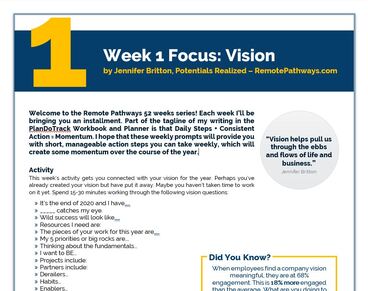 Welcome to the Remote Pathways 52 weeks series! Each week I’ll be bringing you an installment. Part of the tagline of my writing in the PlanDoTrack Workbook and Planner is that Daily Steps + Consistent Action = Momentum. I hope that these weekly prompts will provide you with short, manageable action steps you can take weekly, which will create some momentum over the course of the year.  Activity This week’s activity gets you connected with your vision for the year. Perhaps you’ve already created your vision but have put it away. Maybe you haven’t taken time to work on it yet. Spend 15-30 minutes working through the following vision questions:
Don’t just go through this exercise and forget it. You may want to condense your focus onto a one pager that you can keep it visible throughout the year. I just wrapped up a coaching session with a group who had gone through a similar exercise last year at this time. One of the major success factors they mentioned was “keeping their vision visible throughout the year”. Visions help us through the ups and downs. They are the big picture we reach towards. So what? – What’s important about this topic? Our vision can help to clarify where we focus and what we say “no” to. A compelling vision will help our prioritization and focus. As Seneca wrote in Ancient Greece, “If a [person] knows not to which port he sails, no wind is favorable.” Where to go? If you have a copy of PlanDoTrack, check out the Vision Questions on page 99. Now What? What will you do? Take time today to either revisit your vision or work on your vision. Make it visible. Best wishes! Jennifer Check out the most recent Remote Pathways Podcast Episode which covers the topic of Vision. You can listen to Episode 4 here, or on your favorite podcast player.
|
AuthorThe Remote Pathways blog follows many of the themes we explore in the Remote Pathways Podcast. This year (2020) we're proud to bring you a 52 week-series for you to follow along throughout the year. Posts are penned by co-host Jennifer Britton, an avid award-winning blogger for many years. Jennifer is the author of five books. Visit her author page on Amazon. Archives
December 2020
Categories
All
|

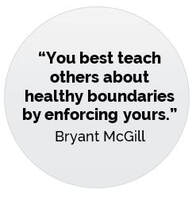
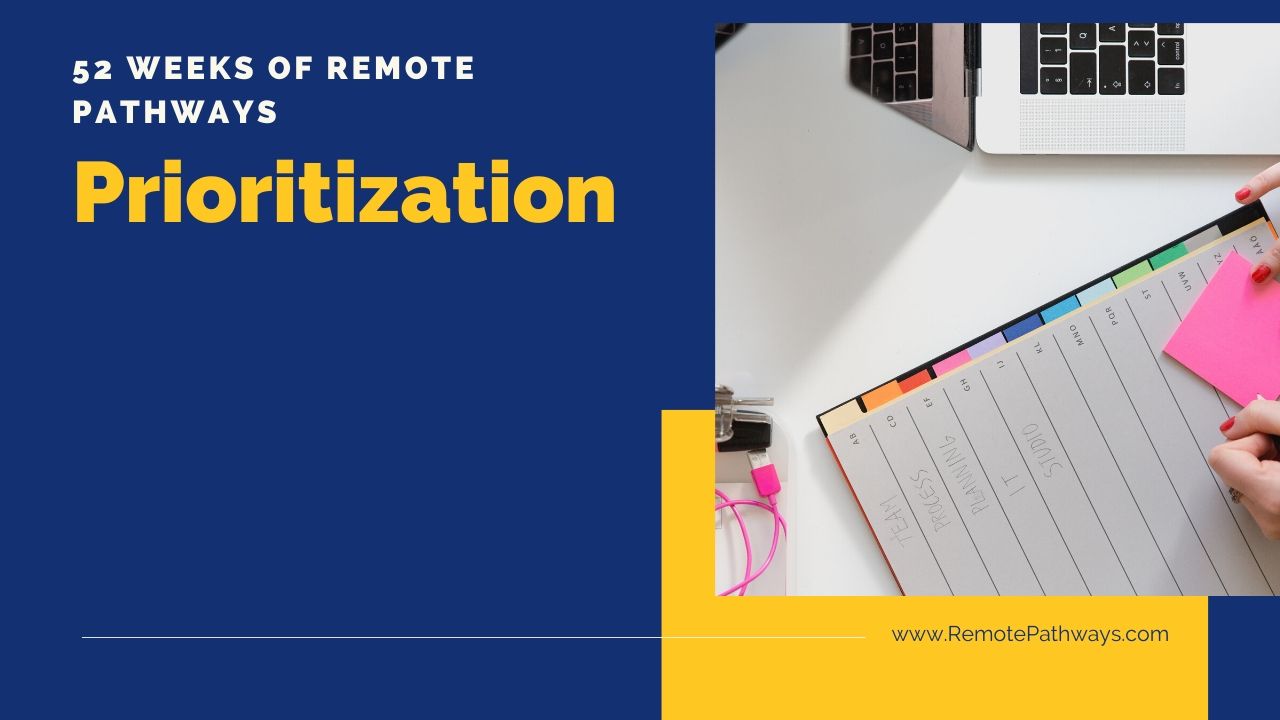
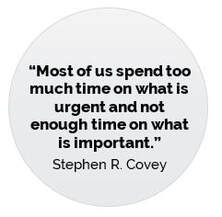

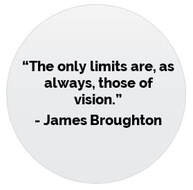

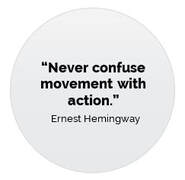


 RSS Feed
RSS Feed